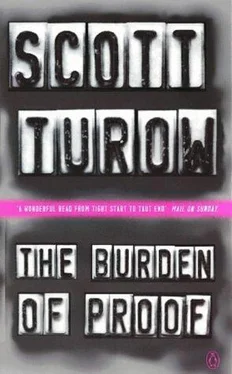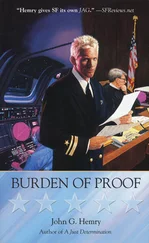Scott Turow - The Burden of Proof
Здесь есть возможность читать онлайн «Scott Turow - The Burden of Proof» весь текст электронной книги совершенно бесплатно (целиком полную версию без сокращений). В некоторых случаях можно слушать аудио, скачать через торрент в формате fb2 и присутствует краткое содержание. Жанр: Детектив, на английском языке. Описание произведения, (предисловие) а так же отзывы посетителей доступны на портале библиотеки ЛибКат.
- Название:The Burden of Proof
- Автор:
- Жанр:
- Год:неизвестен
- ISBN:нет данных
- Рейтинг книги:3 / 5. Голосов: 1
-
Избранное:Добавить в избранное
- Отзывы:
-
Ваша оценка:
- 60
- 1
- 2
- 3
- 4
- 5
The Burden of Proof: краткое содержание, описание и аннотация
Предлагаем к чтению аннотацию, описание, краткое содержание или предисловие (зависит от того, что написал сам автор книги «The Burden of Proof»). Если вы не нашли необходимую информацию о книге — напишите в комментариях, мы постараемся отыскать её.
The Burden of Proof — читать онлайн бесплатно полную книгу (весь текст) целиком
Ниже представлен текст книги, разбитый по страницам. Система сохранения места последней прочитанной страницы, позволяет с удобством читать онлайн бесплатно книгу «The Burden of Proof», без необходимости каждый раз заново искать на чём Вы остановились. Поставьте закладку, и сможете в любой момент перейти на страницу, на которой закончили чтение.
Интервал:
Закладка:
Capital no longer equaled Power in America in the same brute fashion.
But Henry, no less than anyone else, was the image of his times, when it was expected that a business lawyer of his eminence be a gentleman to his clients and a son of a bitch to everyone else.
Seven young attorneys worked for Henry in paneled suites in the old LeSueur building, with its Art Deco features of heavy turned brass.
Graduating from law school, Stern had responded to an ad in one of the lawyers' gazettes and rented a single room. It was a promising arrangement. Henry did not go to court himself. There would be occasional matters of small consequence that he might refer to Stern.
Collections, liens, attachments. Small divorces, perhaps.
Minor personal-injury matters, or traffic tickets. It made little difference. If the flow was steady enough, Stern could satisfy his rent of $35 a month.
For this sum, Stern acquired use of Mittler's law library-which had seemed an impressive concession, although the gilt-trimmed treatises on commercial matters contributed nothing to the criminal practice that Stern wished to establish-and Mittler' s secretary took his phone messages. In those first months, he could not afford a telephone of his own. Stern' s calls were received on Mittler' s general number and returned, a dime apiece, from a wooden phone booth in the lobby thirty-two floors below.
This arrangement, comfortable to Stern, was soon unacceptable to Henry.
He had no complaints with Stern's handling of the matters he referred.
But he did not care for the clientele that Stern brought back from police court, where once or twice a week he would stand in the corridors in the hopes of drumming up some kind of a practice. After two or three barren attempts, he had attracted the attention of a police sergeant named Blonder, and for a fee of $5 for each success, Blonder had begun carrying on in lyrical fashion about Stern's many triumphs and passing out his card to the detainees being ferried in the police paddy wagon.
These clients-gypsies, shoplifters, drinkers who had become embroiled in barroom disputes-would come to the oak. wainscoted offices of Henry Mittler to wait for Mr. Stern, beside Henry's client, Buckner Levy, in pince-nez and fedora, the president of the Cleveland Street Commercial Bank. There were no incidents, but the sight of these toughs, who sat in their undervests smoking cigarettes and, on one or two occasions, mistaking the ashtrays for spittoons, drove Henry wild. By the time Stern happened to meet Clara, his clients had been relegated to a bench in the hallway, while Henry contemplated a more complete eviction for Stern himself. In fact, in his initial rage, Henry had directed Stern to initiate the search for new quarters, although afterwards no more was said of that.
As for Clara, she was employed in her father' s office two or three days a week. Stern's first sight of her was from the hallway as he was passing. She was a slender young woman of erect carriage who sat before Henry Mittler with a green stenographic pad in hand. Stern paused; something was not in place. She had a finished look, expensively dressed in a silk blouse and a brown skirt of fine wool; she wore pearls. Then he noticed that she was seated not on a chair but on the footstool of Mittler's easy chair.
"Yes, Stern." Henry had caught sight of him in the doorway.
Stern, who had not meant to stop, said he would come back later, but Mittler was in an expansive mood and more or less ordered him into the office. "My daughter," he said, with his hand raised, while he looked across his desk for something else.
Her hair, a muted reddish shade like finished cherrywood, was cut anfashionably short; her complexion, flawed by one or two livid marks near one cheekbone, was generally pallid; and Stern on first impression could not tell if she was pretty or plain. Her expression certainly seemed deadened. She nodded to Stern with no more interest than she would have to a stick of furniture.
It was his pipe Henry had been searching for. suppose you've made other arrangements by now," he said as he shot fire into the.meerschaum bowl.
"Not just yet," said Stern-.
Years later, Stern could still remember the shocking speed with which he had calculated the advantages of winning this young woman's attention.
It was Henry, however, not Stern, who had gotten them started.
"Stern is from Argentina," said her father.
She brightened. "From?" she asked.
In 1956 most Americans regarded foreigners of all kinds with apprehension; about Argentina they wished to learn no more than the tango. Stern was grateful for her interest.
"B.A., principally. We lived in different parts. My father was able to turn the practice of medicine into an itinerant trade."
"Your father was a doctor?" asked Henry. "You've always made out like you were some impoverished son of a bitch.
Pardon, Clara."
"Regrettably true," said Stern.
"This is the one who goes down to the lobby to use the telephone," said Henry.
"Ah," said Clara.
The heat of shame rushed up on poor Stern. Clara seized his arm.
"Daddy, you' re embarrassing Mr. Stern."
Henry made a face. It-was no matter to him.
From these first instants some elements seemed incomprehensible. She was too sophisticated-too rich-a young woman to be a stenographer, but she appeared two or three times a week, typing and answering the phone.
When Stern happened by, she would smile idly, a self-contained human being, hard to decipher beyond a heavyhearted stoical exterior.
"You are a student?" he asked her one day, impulsively, when he was in the hallway near the small interior office that she shared with two other women.
"Me? No. I finished college three years ago. Four. Why would you ask?"
"I imagined-" said Stern. He was lost, as usual, for the proper word.
"That I was younger," she said.
"Oh, no." This truly had not entered his mind, but the young woman seemed to shrink from him. She had embarrassed herself by exposing this. vulnerability. '"I wondered simply how you were otherwise engaged, when you were not here."
"You think I have something better to do than my father' s typing?"
"Miss," said Stern, but he saw then that she was attempting to be coquettish and was, simply, awkward at it. "I am certain you are capable of many things."
She did not answer. He turned away, morose, Truly, he was doomed with this family. A few days later, however, as he was passing in the hall, she called.
"Mr. Stern?" He looked in, not certain that it was her voice he'd heard. Her eyes were down as she pecked at the typewriter, a substantial mass of black cast iron.
Eventually, she spoke, though it seemed to require considerable deliberation. "Tell me, Mr. Stern, what did you suppose I studied?"
Oh, dear. Now what? He seized on something likely to be inoffensive.
"My estimate, I suppose, is that you were a musician." Her immediate look of pleasure was incandescent. "My father told you."
"No," said Stern, enormously relieved.
"You enjoy music?"
"Very much." This was not really a lie. Who did not like music? She had studied the piano for many years, she said.
She mentioned composers whom Stern knew merely by name.
Vaguely, they agreed to enjoy music together on some future occasion.
Yet, as Stern came away from the conversation, he was struck again by how peculiar this young woman seemed.
College educated and half-idle, full of such taut sensitivity. How old was she? Twenty-four or twenty-five, Stern calculated, a year or two older than he. Old for a girl not to be married,. even in the States.
The next week, Henry called him to his office. On his way, Stern feared that his eviction was about to be consummated, but he could tell at once, from the way Henry groused and pawed about,' that he had something else on his mind. If Henry were revoking a license at will, he would do it without hesitation.
Читать дальшеИнтервал:
Закладка:
Похожие книги на «The Burden of Proof»
Представляем Вашему вниманию похожие книги на «The Burden of Proof» списком для выбора. Мы отобрали схожую по названию и смыслу литературу в надежде предоставить читателям больше вариантов отыскать новые, интересные, ещё непрочитанные произведения.
Обсуждение, отзывы о книге «The Burden of Proof» и просто собственные мнения читателей. Оставьте ваши комментарии, напишите, что Вы думаете о произведении, его смысле или главных героях. Укажите что конкретно понравилось, а что нет, и почему Вы так считаете.












